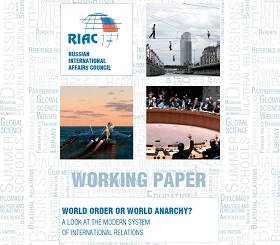Aristotle defined a city as a "unity out of plurality of individuals". Probably, this definition is suitable for the whole world, especially in the present era of globalization. Is there a contradiction in this formula, and is identity compatible with universalism?
Aristotle defined a city as a "unity out of plurality of individuals". Probably, this definition is suitable for the whole world, especially in the present era of globalization. Is there a contradiction in this formula, and is identity compatible with universalism?
Generally speaking, the stability and adaptability of systems consisting of unlike (distinctive) elements, has many confirmations. And not only in society, but also in nature. It has long been known that intraspecific competition is more violent than interspecies competition, because only in the first case the resource requirements of competing individuals are completely identical. At the same time, the sustainability of any natural ecosystem directly depends on the diversity of species of living beings that make it up. Individual species complement each other, creating branched and intersecting food chains; accordingly, it is diversity that minimizes the danger that if one of the elements falls out (the disappearance of some species), the whole system collapses, and the extinction of other species begins.
The history of international relations confirms this general pattern, although, of course, it brings its amendments and clarifications. For example, the stability of the system of the nineteenth century’s European concert was mainly based on the socio-economic diversity of its member states. On the other hand, the presence of common "species specificities" of the great totalitarian systems of the first half of the twentieth century in no way prevented their clashes with each other. We can also say, that deep and principled "species differences" between the USSR and the United States contributed to the stability of the Cold War-era world system, while "intraspecific" Soviet-Chinese competition reached direct military clashes in the same period of history.
Thus, the conflict of universalism and identity seems fictitious, if we understand by universalism a certain set of common (universal) laws, rules, hierarchies and models of interaction of individual elements with each other within a system. No system, biological or social, can exist without such set of laws, since they constitute its structure. As to modern international relations, the structure functioning is determined by the existing universal norms of international law, established regimes and traditions, a network of bilateral and multilateral international agreements, regional and international organizations, headed by the United Nations. This universalism is not always effective; it periodically fails and needs constant improvement. But in general the international system still functions in one way or another.
It is quite another matter if by universalism we understand the global unification of the way of life and the system of normative regulations. That means a rejection of any group, national self-identifications in exchange for "global" individual self-consciousness in the spirit of Jacques Attali or George Soros. (However, long before prominent Western practitioners of the natural philosophy, this idea was voiced by Makar Nagulnov, the hero of Mikhail Sholokhov's novel "Virgin Soil Upturned": "Everyone will be blended and there will not be such a state in the whole world that one body is white, another yellow, and the third is black-skinned ... All will be nicely slightly dark-complexioned and look the same").
Such universalism, if realized, would result in a sharp decline of the complexity of the global society as a whole and the international system in particular. Reducing complexity, in turn, would dramatically increase the level of systemic risks and challenges. Let’s recall that a man-cultivated field is a much less stable system than a natural forest. The explosion of ethno-cultural, regional, national, religious and other forms of group identity that is taking place before our eyes is, in fact, nothing but a natural reaction of the system to challenges, connected with the tendency to reduce its complexity and the diversity of its elements. The living cell stubbornly does not want to turn into a dead crystal, even with perfect edges.
At the same time, to identify the revival of group identity with a banal return to the archaic traditionalism would be at least incorrect. After all, along with the traditional forms of self-identification (family, city, country, religion), there are also completely new forms (for example, the self-identification of gamers in their favorite network games). In other words, the vector of development of group identity is directed not only to the past, but also to the future.
The question of the preservation of universal norms under these conditions becomes more difficult, since it is necessary to take into account a greater number and an increased variety of elements of the system. Relatively speaking, the world of the future will be built not from several identical cubes played by our grandfathers and grandmothers in their distant childhood, but from the premium Lego kit, bought for our children's birthday. And every season the indefatigable producer of our construction kit (the world society) offers the hooked buyers new and new elements of the game, and they also need to find a suitable place in the erected construction. There is something to scratch your head over. But, even with a pretty fiddling with a modern puzzling kit, the humanity is unlikely to return to the antediluvian cubes.
First published in the Valdai Discussion Club.







